 Petzlover
PetzloverBohemian Shepherd is originated from Czech Republic but Russian Setter is originated from Russia. Bohemian Shepherd may grow 12 cm / 4 inches shorter than Russian Setter. Bohemian Shepherd may weigh 7 kg / 15 pounds lesser than Russian Setter. Both Bohemian Shepherd and Russian Setter has almost same life span. Both Bohemian Shepherd and Russian Setter has almost same litter size. Both Bohemian Shepherd and Russian Setter requires Moderate Maintenance.
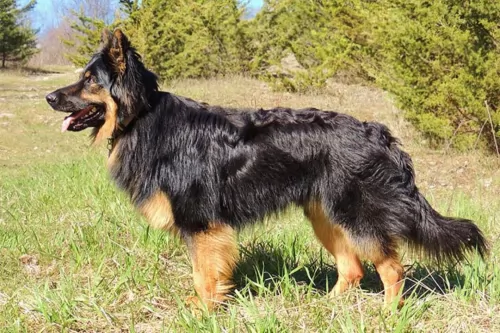 Known as the Chodský pes or the Chodenhund, the Bohemian Shepherd is native to the Czech Republic and is a herding breed. Like many other old dog breeds, nothing is 100% certain about is history. This is thought to be because the breed was developed centuries before the keeping of records. It is certain however, that the breed developed in the south-western portion of the Kingdom of Bohemia, which is now part of the Czech Republic.
Known as the Chodský pes or the Chodenhund, the Bohemian Shepherd is native to the Czech Republic and is a herding breed. Like many other old dog breeds, nothing is 100% certain about is history. This is thought to be because the breed was developed centuries before the keeping of records. It is certain however, that the breed developed in the south-western portion of the Kingdom of Bohemia, which is now part of the Czech Republic.
It is believed the Bohemian Shepherd came from herding dogs such as the Pinscher/Schnauzer, Spitzen or even a dog/wolf hybrid. It was in November 1991, that the Bohemian Shepherd Lover’s Club was founded. Many Bohemian Shepherd breeders have been registered and today the breed has earned the reputation for being a superb family dog. The dog has also been granted recognition with the Czech National Kennel Club.
People often think it is ridiculous that a Setter dog comes from Russia. It is believed that the Russians did have some kind of Griffon and the word Pointer is also often translated as Setter.
It is believed that the Russian Setter is one of the ancestors of the Wire-haired Pointing Griffon and that it possibly shared an ancestry with the German wire-haired and broken-haired pointers.
References to Russian Setters were fairly common in the 19th century, but there is such contradictory information that it is hard to get good information on the dogs. The Russian Setter is believed to have existed before the Russian Revolution resembling the English Setter. Dog experts tell us the dog no longer exists.
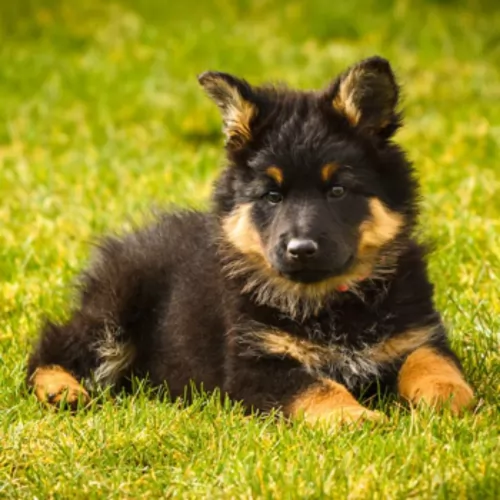 The medium sized Bohemian Shepherd looks much like a combination between the Collie and German Shepherd. He is 48-55 cm in height and weighs about 15-25 kg. The Bohemian Shepherd has a thick, long coat which is black and tan in color and with an undercoat, allowing him to cope in icy weather conditions. His well proportioned body is muscular and compact with a long bushy tail and erect ears.
The medium sized Bohemian Shepherd looks much like a combination between the Collie and German Shepherd. He is 48-55 cm in height and weighs about 15-25 kg. The Bohemian Shepherd has a thick, long coat which is black and tan in color and with an undercoat, allowing him to cope in icy weather conditions. His well proportioned body is muscular and compact with a long bushy tail and erect ears.
The Bohemian Shepherd makes a wonderful family pet, becoming very attached to his human family. He has a good reputation with children too and will get on well with other pets in the home. He is so amicable that he makes a good pet choice for those looking to own a dog for the first time.
He is intelligent and alert and also protective of his family, making him an excellent guard dog. He is easily trainable, and just like with any other dogs, will require training and socialization.
In terms of appearance, it was John Henry Walsh who said that the Russian Setter was a dog hidden by its long, woolly matted coat.It seems to have been a medium sized dog with an elegant appearance. It seems the dog came in two varieties - the curly coated liver coated dogs and the fawn colored dogs which are straight coated.
Because there is very little information on these dogs, we assume they were between 57 – 68cm in height and between 27 and 32kg in weight. The coat was no doubt in colours such as grey, reddish-brown with some black and white and shortish and wiry. The ears were floppy,and the face no doubt had some longer hair around the muzzle.
Nobody seems to know exactly what the temperament of this dog was, but when you look at some of his ancestors you can assume that he was strong-willed, confident and a skilled hunter.
He would have required a lot of exercise too. He was lively and energetic. Because he had Pointer in him you can be sure that he would have been intelligent so that he could be trained and socialized.
He would have been keen to learn with an owner who was firm and consistent in his treatment of him. He is a dog most happiest when he can spend time with his human family, a most loyal and devoted family friend, capable of getting on well with children and pets in the home.
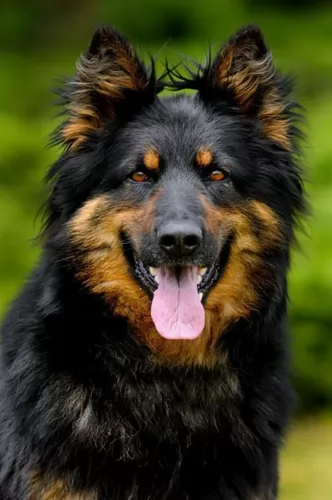 Playful by nature, friendly, gentle and co-operative, your Bohemian Shepherd will make a wonderful pet and he is a real social character, loving to spend lots of time with his human family. With minimal health conditions and without requiring much maintenance, he is an adaptable dog and will easily settle into city- or country living, so long as he is given regular exercise and attention.
Playful by nature, friendly, gentle and co-operative, your Bohemian Shepherd will make a wonderful pet and he is a real social character, loving to spend lots of time with his human family. With minimal health conditions and without requiring much maintenance, he is an adaptable dog and will easily settle into city- or country living, so long as he is given regular exercise and attention.
He is courageous and intelligent and also makes an excellent guard-dog. With so much going for this beautiful dog, he simply makes a loyal, loving and devoted family pet.
It appears, according to records that the Russian Setter has come and gone. However he would have been a calm, gentle pet with running ad hunting keeping him happy. He would therefore have required a lot of exercise.
We can assume that according to the few records that there are, that this was an affable, pleasing dog breed which made a great family pet.
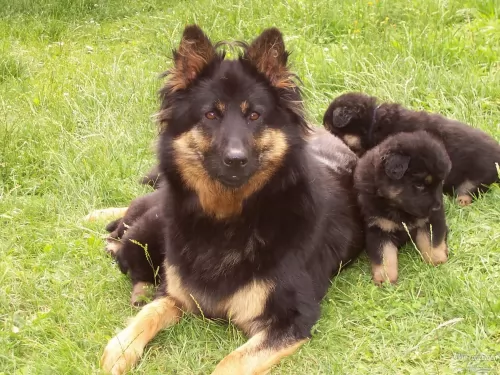 Breeding organizations are continually trying to minimize the diseases within limited-gene-pool dog breeds. While the Bohemian Shepherd is a generally health breed, there are diseases that are more common with the Bohemian Shepherd and which you need to be aware of -
Breeding organizations are continually trying to minimize the diseases within limited-gene-pool dog breeds. While the Bohemian Shepherd is a generally health breed, there are diseases that are more common with the Bohemian Shepherd and which you need to be aware of -
This is a painful disease – a problem with the formation of the hips – where the dog can develop arthritis and even become lame.
This is a condition where gas gets trapped in the stomach of your pet, so that he swells up, sometimes causing the stomach to twist. This is an emergency for your pet and it is extremely painful. Nobody really knows the cause, but when the gas is trapped inside the stomach, the bloated stomach of your pet requires you getting to the vet as quickly as you can.
Look out for Progressive Retinal Atrophy known as PRA . This is a group of degenerative diseases that affect the photoreceptor cells where the cells deteriorate and can result in blindness with your pet. Fortunately it isn’t a painful condition.
The Russian Setter had an average lifespan of 10 – 14 which is a fairly good innings for a dog. Nonetheless you would have had to be aware of some common dog problem. These dogs were prone to major health issues such as both hip and elbow dysplasia, deafness, epilepsy and hypothyroidism.
The thyroid glands produce hormones that affect the function of many parts of the body. Dogs with this illness have a low production of thyroid hormones.
This disease is mainly caused by inflammation or shrinkage of the thyroid gland. The most common signs of low thyroid in dogs is thinning of the fur, the coat is dull, there is weight gain and excess shedding. The dog doesn’t tolerate cold well either. These dogs also often have ear infections.
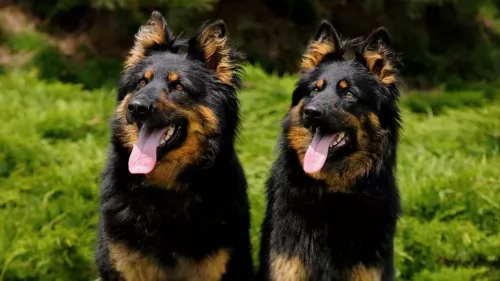 The Bohemian Shepherd is an energetic breed and will need to be exercised regularly. He’ll love to run alongside your bike on your cycling trips or you can take him on a long walk. Having said that, he is an easy going dog and can adapt to city- and country life, but if it’s city life, you can’t leave him cooped up in a small yard and think that will suffice. He has a personality that longs to be part of the family.
The Bohemian Shepherd is an energetic breed and will need to be exercised regularly. He’ll love to run alongside your bike on your cycling trips or you can take him on a long walk. Having said that, he is an easy going dog and can adapt to city- and country life, but if it’s city life, you can’t leave him cooped up in a small yard and think that will suffice. He has a personality that longs to be part of the family.
Your Bohemian Shepherd is a moderate shedder in spite of his thick beautiful coat. The coat will certainly need a good brushing at least twice a week to get rid of that loose hair. Not only that, your social Bohemian Shepherd will love the closeness to you that the brushing brings.
Keep his nails short and his teeth brushed at least 2 or 3 times a week to ensure there is no plaque build up. There are special toothbrushes and toothpastes made for dogs. Don’t use human toothpaste as the ingredients will be harmful to your pet.
Your Bohemian Shepherd, after one year of age, will eat one or two bowls of food a day. You’ll be able to tell what suits your dog, because the amount will eat about 2 to 4 cups of a good quality dry dog food a day, split into at least two meals. The amount can vary depending on its health, build, age, activity level and metabolism. Make sure it has access to water at all times and that it is changed as often as possible.
Whatever kind of coat the Russian Setter ad it would have required a brushing twice a week to keep it in top form.
The medium length floppy ears would have to be checked inside for ear infection.
His owners would have checked inside the mouth for any signs of rotten or bad teeth.
His nails would have required trimming.
Dogs need the best food there is to stay healthy. The Russian Terrier, if it were still around today, would have had the best commercially manufactured food there was.
You want to provide dogs with some good homemade food too. Dogs thrive on simplicity and consistency to avoid upsetting the stomach. Some home-cooked food such as boiled chicken, sweet potatoes, brown rice or pasta, carrots and spinach would be perfect for him. Chop the food up finely and add it into the dry kibble once or twice a week. Raw meat should also be added in when possible to promote good skin health.
Make sure your pet is never without a constant supply of fresh, cool water.